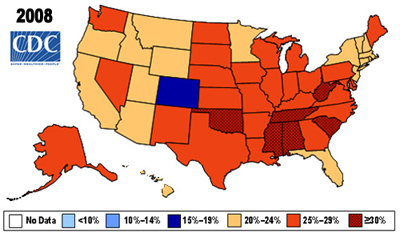 After a summer of hearing about death panels and tea baggers, it's nice to finally see the discussion on health care reform turn to nutritious eating and exercise. What's interesting to this arugula-eating liberal, however, is that this conversation has started on the conservative side of the table. After President Obama's speech on health care last week, Rep. Charles Boustany, R-La., a cardiovascular surgeon, gave the GOP response. While supplying the nation with his rebuttal to President Obama's speech, he mentioned what I found to be a very interesting plea to include a sense of personal responsibility for one's health into the dialogue. According to Representative Boustany, "... insurers should be able to offer incentives for wellness care and prevention. That's something particularly important to me. I operated on too many people who could have avoided surgery if they'd made simply -- simply made healthier choices earlier in life."
After a summer of hearing about death panels and tea baggers, it's nice to finally see the discussion on health care reform turn to nutritious eating and exercise. What's interesting to this arugula-eating liberal, however, is that this conversation has started on the conservative side of the table. After President Obama's speech on health care last week, Rep. Charles Boustany, R-La., a cardiovascular surgeon, gave the GOP response. While supplying the nation with his rebuttal to President Obama's speech, he mentioned what I found to be a very interesting plea to include a sense of personal responsibility for one's health into the dialogue. According to Representative Boustany, "... insurers should be able to offer incentives for wellness care and prevention. That's something particularly important to me. I operated on too many people who could have avoided surgery if they'd made simply -- simply made healthier choices earlier in life."
This portion of the speech really surprised me. At face value, it makes sense that people should take responsibility for their own health and for insurers to offer incentives for healthy behavior. Yet eating well is more complex than deciding to have grilled vegetables for dinner instead of a double cheeseburger, particularly for those who are poor and without time and resources. It's no secret that unhealthy foods are simply cheaper and more prevalent than whole grains, fresh vegetables, and unprocessed meats. Think of McDonalds' popular dollar meals. Cheap meals are often the only food available for many Americans, and actual food choices are often nonexistent for people on constrained budgets.
Interestingly, the Centers for Disease Control and Prevention (CDC) recently released an obesity map of America. It's a depressing bit of data, but here you go:

CDC's Obesity Trends, which includes a breakdown of state by state percentages
It's disheartening to see that the obese population in numerous states is over 30%, with other states close behind. Yet, although I appreciate Mr. Boustany's commitment to healthy choices, I don't think providing "incentives for wellness care and prevention" is realistic without first implementing legislation to make healthier foods accessible to everyone -- rich, middle class and poor. For instance, both Republicans and Democrats have traditionally supported some serious corn and soy subsidies in the farm bill, making cheap corn and soy-based products pervasive in the American food system. Many nutritionists, doctors, and health professionals believe the prevalence of corn and soy in our diet has lead to those skyrocketing obesity rates in America. It doesn't seem fair to tell people they need to make "healthier choices earlier in life" without first changing the farm subsidy program so real food choices emerge. How about instead creating incentives for farmers to grow more nutritious crops so healthier foods are more affordable?
Another interesting feature of the CDC map is that the highest rates of obesity occur in traditionally conservative strongholds, including Mr. Boustany's home state of Louisiana, which has a 28.3% obesity rate compared to 23.7% for California. Mississippi's rate is a staggering 32.8%. Now I am not trying to claim that Democrats are healthier than Republicans. There are plenty of Republicans who run 10 miles a day and love tofu, and lots of Democrats who fry Snickers bars and drive if they are traveling more than 100 feet. It seems, however, that overall, states that favor conservative candidates are simply fatter (at least according to that pinko institution the CDC) than more liberal-leaning states.